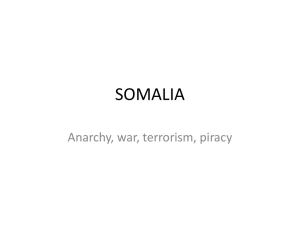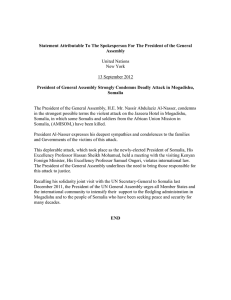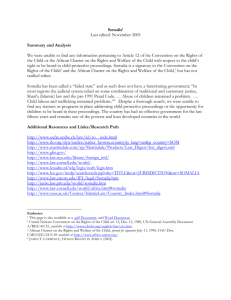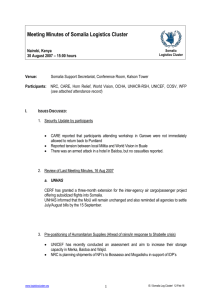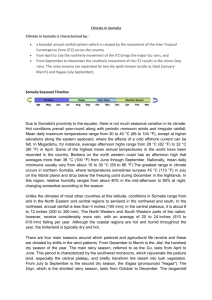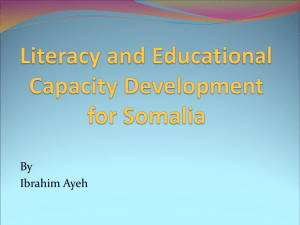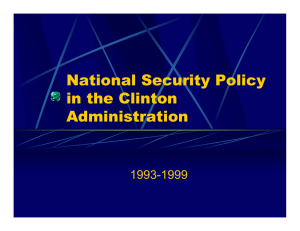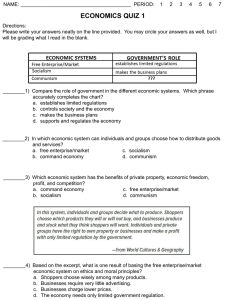Document 17686421
advertisement
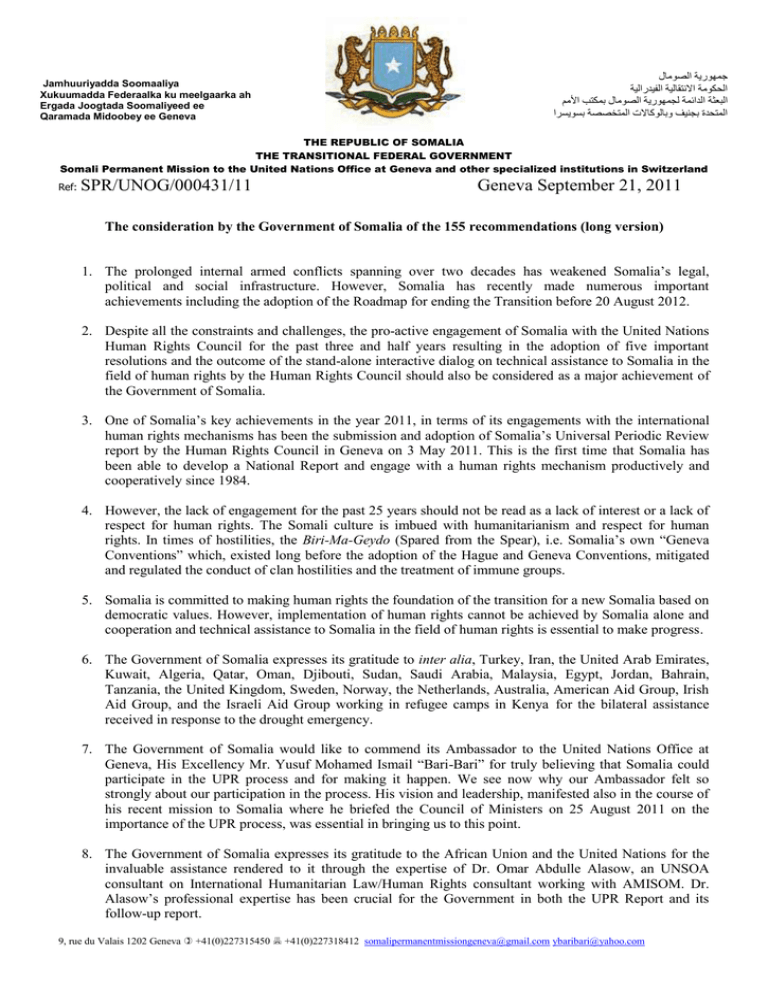
Jamhuuriyadda Soomaaliya Xukuumadda Federaalka ku meelgaarka ah Ergada Joogtada Soomaliyeed ee Qaramada Midoobey ee Geneva جمهورية الصومال الحكومة االنتقالية الفيدرالية البعثة الدائمة لجمهورية الصومال بمكتب األمم المتحدة بجنيف وبالوكاالت المتخصصة بسويسرا THE REPUBLIC OF SOMALIA THE TRANSITIONAL FEDERAL GOVERNMENT Somali Permanent Mission to the United Nations Office at Geneva and other specialized institutions in Switzerland Ref: SPR/UNOG/000431/11 Geneva September 21, 2011 The consideration by the Government of Somalia of the 155 recommendations (long version) 1. The prolonged internal armed conflicts spanning over two decades has weakened Somalia’s legal, political and social infrastructure. However, Somalia has recently made numerous important achievements including the adoption of the Roadmap for ending the Transition before 20 August 2012. 2. Despite all the constraints and challenges, the pro-active engagement of Somalia with the United Nations Human Rights Council for the past three and half years resulting in the adoption of five important resolutions and the outcome of the stand-alone interactive dialog on technical assistance to Somalia in the field of human rights by the Human Rights Council should also be considered as a major achievement of the Government of Somalia. 3. One of Somalia’s key achievements in the year 2011, in terms of its engagements with the international human rights mechanisms has been the submission and adoption of Somalia’s Universal Periodic Review report by the Human Rights Council in Geneva on 3 May 2011. This is the first time that Somalia has been able to develop a National Report and engage with a human rights mechanism productively and cooperatively since 1984. 4. However, the lack of engagement for the past 25 years should not be read as a lack of interest or a lack of respect for human rights. The Somali culture is imbued with humanitarianism and respect for human rights. In times of hostilities, the Biri-Ma-Geydo (Spared from the Spear), i.e. Somalia’s own “Geneva Conventions” which, existed long before the adoption of the Hague and Geneva Conventions, mitigated and regulated the conduct of clan hostilities and the treatment of immune groups. 5. Somalia is committed to making human rights the foundation of the transition for a new Somalia based on democratic values. However, implementation of human rights cannot be achieved by Somalia alone and cooperation and technical assistance to Somalia in the field of human rights is essential to make progress. 6. The Government of Somalia expresses its gratitude to inter alia, Turkey, Iran, the United Arab Emirates, Kuwait, Algeria, Qatar, Oman, Djibouti, Sudan, Saudi Arabia, Malaysia, Egypt, Jordan, Bahrain, Tanzania, the United Kingdom, Sweden, Norway, the Netherlands, Australia, American Aid Group, Irish Aid Group, and the Israeli Aid Group working in refugee camps in Kenya for the bilateral assistance received in response to the drought emergency. 7. The Government of Somalia would like to commend its Ambassador to the United Nations Office at Geneva, His Excellency Mr. Yusuf Mohamed Ismail “Bari-Bari” for truly believing that Somalia could participate in the UPR process and for making it happen. We see now why our Ambassador felt so strongly about our participation in the process. His vision and leadership, manifested also in the course of his recent mission to Somalia where he briefed the Council of Ministers on 25 August 2011 on the importance of the UPR process, was essential in bringing us to this point. 8. The Government of Somalia expresses its gratitude to the African Union and the United Nations for the invaluable assistance rendered to it through the expertise of Dr. Omar Abdulle Alasow, an UNSOA consultant on International Humanitarian Law/Human Rights consultant working with AMISOM. Dr. Alasow’s professional expertise has been crucial for the Government in both the UPR Report and its follow-up report. 9, rue du Valais 1202 Geneva +41(0)227315450 +41(0)227318412 somalipermanentmissiongeneva@gmail.com ybaribari@yahoo.com 10. The Government of Somalia would like to express profound appreciation to States which made recommendations to Somalia and the States who could not deliver their recommendations due to time constraints, the Troika, Angola, Mexico, Thailand and the Working Group on the UPR for their constructive engagement. We thank them for their comments, suggestions and recommendations. 11. Somalia takes the participation of the UPR exercise as an important opportunity to reflect and take stock of our situation of human rights in Somalia and the progress that hopefully we are able to show in four years. 14. Somalia welcomes the recommendations made in the course of its Universal Periodic Review on 3 May 2011. After consultations and careful evaluation of the recommendations, Somalia is pleased to provide the following responses: 98.1. Somalia accepts the recommendation in part. In principle, Somalia accepts the recommendation and will sign the Optional Protocol to the Convention against Torture and Other Cruel, Inhuman or Degrading Treatment or Punishment (OP-CAT). However, ratification of OP-CAT will be examined by Somalia as a longer-term project subject to further study and understanding of the treaty. Somalia is in the process of strengthening its understanding of the provisions of the Convention for the Protection of All Persons from Enforced Disappearance and their implications, for implementation. The Government fully supports the principles enshrined in the Rome Statute of International Criminal Court and is committed to ending the persisting culture of impunity and ensuring that perpetrators of violations of human rights and international humanitarian law (IHL) are held accountable for their actions and that justice is done. At the moment, however, conditions are not ripe for Somalia to become a party to the Rome Statute of the International Criminal Court. The Government is in the process of taking important steps towards building a stable Somalia and reestablishing the rule of law, including legal and security institutions. It is also developing a national reconciliation strategy involving all parties and does not want to disrupt such efforts and prolong the conflict. Progress in the national reconciliation strategy is a pre-requisite to any meaningful discussion of the ratification. The Government is firmly committed to creating the conditions that would allow Somalia’s ratification of the Rome Statute of International Criminal Court in the future. Such conditions that would create a favourable environment include more in-depth study of the Statute, raising awareness and understanding of the Statute and the fact that it has no retroactive jurisdiction. 98.2. Somalia accepts the recommendation. Ratification of the Convention on the Elimination of All Forms of Discrimination against Women (CEDAW) is contained in the voluntary commitment expressed by Somalia (see paragraph 46, UPR National Report). The Government is committed to the ratification of CEDAW and will soon begin the process of ratification. 98.3. Somalia accepts the recommendation. Somalia signed the Convention on the Rights of the Child in May 2002 and its Optional Protocol on the Involvement of Children in Armed Conflict in September 2005 (see paragraph 41, National Report). The Government is in the process of ratifying the Convention and its Optional Protocol and endorses the Paris Commitments to Protect Children from Unlawful Recruitment or Use by Armed Forces or Armed Groups. 98.4. Somalia accepts the recommendation in part. See 98.1, 98.2, 98.3. Ratification of the Convention on the Rights of Persons with Disabilities (CRPD) and its Optional Protocol is contained in the voluntary commitment expressed by Somalia (see paragraph 46, National Report). The Government will soon start the process of ratifying the Convention and its 9, rue du Valais 1202 Geneva +41(0)227315450 +41(0)227318412 somalipermanentmissiongeneva@gmail.com ybaribari@yahoo.com Optional Protocol. In the case of the Optional Protocol to CEDAW, the Convention for the Protection of All Persons from Enforced Disappearance (CED), the Optional Protocol to the Convention on the Rights of the Child on the Sale of Children and the Optional Protocol to the International Covenant on Economic, Social and Cultural Rights (OP-ICESCR), Somalia intends to initiate further study on these instruments and their implications for implementation. 98.5. Somalia accepts the recommendation. See 98.2, 98.3. 98.6. Somalia accepts the recommendation. See 98.2, 98.3. Ratification of the International Convention on the Protection of the Rights of All Migrant Workers and Their Families is contained in the voluntary commitment expressed by Somalia (see paragraph 46, National Report). The Government will soon start the process of ratifying the Convention. 98.7. Somalia accepts the recommendation. See 98.2, 98.3. 98.8. Somalia accepts the recommendation. See 98.2, 98.3. Somalia has expressed its commitment to ratify inter alia, CEDAW, CRC and the Convention on the Rights of Persons with Disabilities and its Optional Protocol (see paragraph 46, UPR National Report). This will bring the number of core human rights treaties to which Somalia is a party to seven besides several optional protocols. 98.9. Somalia accepts the recommendation. See 98.2, 98.3. 98.10. Somalia accepts the recommendation. See 98.3. As regards the United Nations Convention on Transnational Organized Crime and its Protocols, ratification of the Convention and its Protocols is contained in the voluntary commitment expressed by Somalia (see paragraph 46, UPR National Report). 98.11-98.14 Somalia accepts the recommendations. See 98.3. 98.15. Somalia accepts the recommendation. See 98.2. 98.16. Somalia accepts the recommendation. See 98.8. As noted in the UPR National Report, the Government does not want the practice of death penalty to add to more loss of life. The establishment of moratorium on the death penalty is contained in the voluntary commitment expressed by Somalia (see paragraph 51, UPR National Report). While the death penalty is currently imposed for the most serious crimes, the Government undertakes to work towards declaring a moratorium on the death penalty with a view to its eventual abolition. 9, rue du Valais 1202 Geneva +41(0)227315450 +41(0)227318412 somalipermanentmissiongeneva@gmail.com ybaribari@yahoo.com 98.17. Somalia accepts the recommendation. See 98.8. Since March 2008, Somalia has pro-actively engaged and will continue to engage with the Human Rights Council and the Office of High Commissioner for Human Rights. The Government will continue to endeavour to seek technical and financial assistance, within the legal framework of the resolutions adopted by the Human Rights Council concerning assistance to Somalia in the field of human rights, from the OHCHR and bilaterally from willing countries because capacity building is crucial. The Government’s determination and efforts to improve the human rights situation in Somalia and overcome the tremendous challenges faced, as noted in its UPR report, require timely and tangible bilateral and multilateral cooperation and assistance. Somalia hopes that the international community and the OHCHR will continue and increase its support for Somalia to create the conditions for better protection and promotion of human rights for the people of Somalia. This support should be in accordance with its national priorities as identified in the UPR National Report and the Government’s responses to the UPR recommendations as well as its endeavours to implement and report back on the UPR recommendations. The Government of Somalia appeals for and welcomes the much-needed bilateral cooperation for technical assistance and capacity building in the field of human rights with other countries. Somalia commends Egypt, Bangladesh, Azerbaijan, Pakistan, Oman, Nigeria, Saudi Arabia, Italy, Morocco, Kuwait, Israel and Indonesia for the recommendation. 98.18. Somalia accepts the recommendation. The Consultation Draft Constitution of Somalia (hereinafter: "the Draft Constitution") prepared by the IFCC promotes inter alia, respect for human rights, the achievement of social justice and the rule of law. The Draft Constitution contains a Chapter on Fundamental Rights and Freedoms and all fundamental rights and freedoms outlined in the Universal Declaration of Human Rights are indeed fully enshrined in the Draft Constitution. (see paragraph 39, National Report). 98.19. Somalia accepts the recommendation. The Kampala Accord signed on 9 June 2011 provides for the postponement of elections of the President and the Speaker of the Parliament and his Deputies for twelve months after August 2011. This postponement was agreed to in order to adequately prepare and complete priority transitional tasks, including but not limited to security, parliamentary reforms, constitutionmaking process, preparation for elections, and greater political outreach. On the 6th of September 2011, the Government has adopted a detailed Roadmap for ending the Transition before 20 August 2012, which sets benchmarks for the Transitional Federal Institutions and Regional Administrations in Somalia for the remaining one year at a High Level Consultative Meeting held in Mogadishu that brought together a wide spectrum of national and international partners. The Roadmap calls for, inter alia, the reform and overhaul of the existing Independent Federal Constitution Commission (IFCC), the appointment of a nine member constitutional review committee, a thorough public consultations and feedback process to make the actual ownership of the constitutional making process, the harmonizing of some of the contentious issues by a harmonization committee and the adoption of the final draft of the constitution by July 1, 2012. The Government is committed to the implementation of the Roadmap with the agreed benchmarks and timelines. 98.20. Somalia accepts the recommendation. See 98.18. 9, rue du Valais 1202 Geneva +41(0)227315450 +41(0)227318412 somalipermanentmissiongeneva@gmail.com ybaribari@yahoo.com The Draft Constitution provides Somalia to be a federal system in which people democratically will exercise their sovereignty at different levels of government. 98.21. Somalia accepts the recommendation. The harmful practice of FGM is very widespread in Somalia and almost all Somali women and girls are subjected to this damaging practice (see paragraphs 52-53, UPR National Report). Somalia will take all necessary measures including legal measures, educational awareness campaigns, and dialogue with traditional and religious leaders, women’s groups and practitioners of FGM to eliminate the practice of FGM and other forms of violence against women. Somalia is committed to amend its penal code with provisions explicitly prohibiting the practice of FGM. Somalia seeks technical and financial assistance from fellow member States and calls upon the international community to share good practices in eradicating FMG that can be applied to Somalia. 98.22-98.29 Somalia accepts the recommendations. See 98.21. 98.30-98.31 Somalia accepts the recommendations. 98.32. Somalia accepts the recommendation. In Somalia, secular law, and Islamic law (Shari’a) and customary law (Xeer), which is widely practiced, operate simultaneously. The codification and harmonisation of national legislation, including customary law (Xeer), in conformity with Somalia’s international obligations and existing international human rights standards is an immediate priority for the Government of Somalia. 98.33 Somalia accepts the recommendation. The Draft Constitution contains a provision for the establishment of a Human Rights Commission that is independent of Government control. The Government is fully convinced for the usefulness of such Commission to protect and promote human rights in Somalia. The government seeks technical advice and support for the establishment of such a Commission and make it compliance with Paris Principles. 98.34-98.36. Somalia accepts the recommendations. See 98.33. 98.37. Somalia accepts the recommendation. See 98.17, 98.33, 98, 102. The envisaged National Human Rights Commission will also have quasi-judicial functions including carrying out investigations of human rights violations and adjudicating cases. 98.38. Somalia accepts the recommendation. The Government, with the support of AMISOM peacekeepers, took control of 95 percent of Mogadishu in early August 2011 and is extending its authority areas in central and southern Somalia. The Government is committed to setting-up basic civilian structures, through its National Security Stabilisation Plan (NSSP) process such as district security and peace committees, community policing and providing basic services such as health, education and clean drinking water in areas which have recently come under its control. The Government has opened several police stations, set up checkpoints to control movement of vehicles and people and deployed around 5,000 police officers in Mogadishu and other regions. Moreover, it has re-opened most of the police stations in Mogadishu’s liberated areas but also created two new police stations at Suuq-Bacaad and Bakaaraha markets in order to maintain 9, rue du Valais 1202 Geneva +41(0)227315450 +41(0)227318412 somalipermanentmissiongeneva@gmail.com ybaribari@yahoo.com security, law and order and ensure the protection of civilians in line with human rights. The Government is working closely with the international community in particular the UNDP and UNPOS-Security Sector Development (SSD) which is assisting its police and security forces to sustain and build capacity. The current military gains by Government forces and AMISOM peacekeepers present a momentum to act on both the humanitarian and security fronts. The Government recognises and appreciates the support given to the Somali Police Force by the European Union, Japan, Uganda, Kenya, Djibouti, Ethiopia and Sudan. The Government is appealing for bilateral and multi-lateral cooperation in providing the necessary funds to the Government to build the capacity of its police force, through training, rehabilitation and reconstruction of police stations and units, equipment, and the provisions of stipends to ensure the protection of human rights. 98.39-98.40. Somalia accepts the recommendations. See 98.19. 98.41. Somalia accepts the recommendation The Government is committed to making all efforts to strengthen legal and institutional framework for human rights protection, including inter alia, the ratification of core human rights treaties (see paragraph 46, UPR National Report). 98.42. Somalia accepts the recommendation. The Government is committed to creating a culture of human rights awareness for its citizens and will take appropriate measures to enhance education and training in the area of human rights and IHL (see paragraph 72, UPR National Report). 98.43. Somalia accepts the recommendation. See 98.1, 98.42. 98.44. Somalia accepts the recommendation. Somaliland has in place a Human Rights Commission while Puntland is establishing the Office of Human Rights Defenders. Given the planned establishment of the Human Rights Commission at national level, Somalia intends to promote cooperation with the regional authorities of Somaliland and Puntland. 98.45. Somalia accepts the recommendation. See 98.38. Protection of civilians is one of the key benchmarks in the Roadmap. The Government works closely with the United Nations and AMISOM to make concrete progress in the protection of civilians. The Government is also rehabilitating police stations and deploying civilian police with the support of the international community. 98.46. Somalia accepts the recommendation. See 98.17. The Government is consulting with all stakeholders to make steps towards developing a National Action Plan for the promotion and protection of human rights. 98.47. Somalia accepts the recommendation. See 98.38. 98.48. Somalia accepts the recommendation. 9, rue du Valais 1202 Geneva +41(0)227315450 +41(0)227318412 somalipermanentmissiongeneva@gmail.com ybaribari@yahoo.com See 98.38, 98.114. 98.49. Somalia accepts the recommendation. See 98.19. The Government reiterates its commitments to stabilising Somalia, advancing political reconciliation as broadly as possible and building a strong Somalia. The Government has consistently appealed to the insurgents to lay down their arms, renounce violence and reach out to the negotiating table. The Roadmap contains a full section on political outreach and reconciliation and the Government recognizes this area as a priority. 98.50. Somalia accepts the recommendation. See 98.49. 98.51. Somalia accepts the recommendation. The Government is committed to developing legislations and policies for the implementation of economic, social and cultural rights. Health and education are key priority areas. The Government requires the financial and technical assistance of the international community and the relevant international organisations to reach an adequate level of enjoyment of social and economic rights for the people of Somalia. 98.52. Somalia accepts the recommendation. The Government is committed to continuing its efforts to raise awareness concerning human rights, including training, human rights education and awareness raising campaigns, by all means at its disposal (see paragraph 72, UPR National Report). 98.53. Somalia accepts the recommendation. See, 98.49, 98.8. 98.54. Somalia accepts the recommendation. The Government of Somalia has committed to ratify the Optional Protocol to the Convention on the Rights of the Child. We are also working towards the adoption of an Action Plan as required by the United Nations Security Council resolution 1612 of 26 July 2005 and as already committed to by the Government (see paragraphs 81-85, UPR National Report). The Government has issued strict guidelines to all its security forces not to allow the recruitment of children under the age of eighteen and anyone under eighteen found in the Somali national forces to be immediately discharged. The Government is putting in place a system to ensure that its policy of zero tolerance on the use of children into its forces is strictly enforced. 98.55-98.56. Somalia accepts the recommendations. See 98.21. 98.57. Somalia accepts the recommendation in part. The UN Independent Expert on the situation of human rights in Somalia, Dr. Shamsul Bari has already conducted seven visits to Somalia, the latest in July 2011 where he and his team, Mr. Idrissa Oumar Kane, Human Rights Officer, Africa Branch-OHCHR and Mrs. Silvia Lavagnoli, Office in Charge of UNPOS-Human Rights Unit met with the Prime Minister His Excellency Prof. Abdiweli Mohamed Ali and his ministers. On the basis of the experience of working with Dr. Shamsul Bari, we recognize the value brought by the Special Procedures of the Human Rights Council. The Government will issue invitations to Special Procedures case by case prioritising on the basis of the subject matter. Taking advantage of this and in view of the current situation of the country, 9, rue du Valais 1202 Geneva +41(0)227315450 +41(0)227318412 somalipermanentmissiongeneva@gmail.com ybaribari@yahoo.com the Government would like to share with the distinguished members of the Human Rights Council that Somalia is extending a standing invitation to the following Special Procedures: The Special Rapporteur on the right to food. The Special Rapporteur on right to highest attainable standard of physical, mental health. The Special Rapporteur on the human rights to safe drinking water and sanitation. The Special Rapporteur on the rights to education. The Special Rapporteur on violence against women, its causes and consequences. The Special Rapporteur on the human rights of internally displaced persons. The Special Rapporteur on the adverse effects of the movement and dumping of toxic and dangerous products and wastes on the enjoyment of human rights. The Government will soon respond to all outstanding visit requests and is looking forward to receiving the Special Rapporteur on violence against women, its causes and consequences before the end of the year. 98.58. Somalia accepts the recommendation. 98.59. Somalia accepts the recommendation. In its efforts to promote and protect human rights, Somalia is committed to taking into account the specific needs of the vulnerable groups in the society such as children, women, persons with disabilities and older persons. 98.60. Somalia accepts the recommendation. The Government is committed to continuing its efforts to take specific measures to counter serious violations of human rights of women, such as gender-based violence, the lack of services for victims of gender-based violence and sexual violence in particular, forced marriage and FGM. The Ministry of Women and Family Affairs is tasked with leading the Government’s efforts in promoting the advancement of women rights and gender equality. The Government is planning to introduce special programmes and plans, in particular in the areas of education, employment as well as to improve gender representation at all levels of governance. 98.61. Somalia accepts the recommendation. See 98.54. Poverty prevails across the entire Somalia. Approximately 43 percent of the people in Somalia live on less than 1 US dollar a day, 54 percent of whom are living in rural areas, according to the Central Bank of Somalia. The current drought has pushed six regions into famine and 4.0 million people – 3.0 million of whom are in the south – are in crisis in Somalia, with 750,000 people at risk of death in the coming months according to Somalia Food Security and Nutrition Unit (FSNAU). Tens of thousands of people have already died, over half of whom are children according to the same source. Recruitment of children into the armed groups is, by large, caused by poverty and the lack of livelihood opportunities. An estimated 1.8 million children between 5 and 17 years of age are not attending school in south and central Somalia according to OCHA. The Government is committed to providing free and compulsory primary education to all children in Somalia and wishes to open at least one school and one hospital every month in order to ensure that children attend school and access learning opportunities. The Government needs international support in developing a National Development Plan to reduce the level of poverty in Somalia and increase access to basic rights such as such food, water and health services, education and shelter. 98.62. Somalia accepts the recommendation. 98.63-98.67. Somalia accepts the recommendations. 9, rue du Valais 1202 Geneva +41(0)227315450 +41(0)227318412 somalipermanentmissiongeneva@gmail.com ybaribari@yahoo.com See 98.16. 98.68. Somalia accepts the recommendation. See 98.16. The Government will look into the matter regarding the second Optional Protocol to the ICCPR aiming at the abolition of the death penalty. 98.69. Somalia accepts the recommendation. See 98.16. With regard to “eradicate the practice of death penalty by stoning”, this method is not applied in Government held areas. However, there are reports that torture, cruel, inhuman and degrading punishment such as death by stoning, amputations and flogging are used in Al-Shabaab held areas. As the Government extends its authority in those areas, it is committed to eradicating the practice of death by stoning while working towards declaring a moratorium on the death penalty. The perpetrators of such crimes will be held accountable for their actions. 98.70. Somalia accepts the recommendation. See 98.102. The Government will do everything it can to conduct timely and impartial investigations into the killings and threats of violence against journalists and civil society actors and take all the necessary measures to ensure their personal security. The Government will continue its efforts to revise the draft media law to bring it in line with international standards and also to create an environment conducive to freedom of expression (see paragraph 56, UPR National Report). 98.71. Somalia accepts the recommendation. The Government will undertake every effort to stop all violence in the context of the armed conflict, including summary executions, arbitrary, extrajudicial killings, and serious violations of human rights and IHL. Those responsible will be held accountable for their actions. 98.72. Somalia accepts the recommendation. See, 98.70, 98.102. 98.73. Somalia accepts the recommendation. Somalia takes its IHL law commitments extremely seriously. As a state party to the 1949 Geneva Conventions, Somalia has a legal obligation to respect and ensure respect for IHL. All Government and its allied forces are obliged to comply with IHL, both treaty and customary rules and human rights law binding on Somalia. The Somali national forces are instructed to adhere to IHL as well as to the Somali customary rules of warfare, the Biri-Ma Geydo “Spared from the Spear”, even if the insurgent fighters do not. Somali’s traditional rules of warfare which, existed long before the adoption of The Hague and Geneva Conventions, reveal striking similarities with Common Article 3 of the 1949 Geneva Conventions. Indeed, the requirements and prohibitions under Common Article 3 can also be found under Somali customary rules of warfare. The rules traditionally limited the effects of clan hostilities on people and property, protecting certain immune groups, warriors who are not or are no longer participating in hostilities and also place restrictions on the use of certain traditional weapons and practices. The Government is committed to issuing clear and public orders and taking all necessary measures to prevent civilian casualties and ensure compliance with IHL including the core principles of distinction between combatants and civilians and between military objectives and civilian objects, proportionality of the use of force to ensure that civilian losses are not disproportionate to direct and concrete military objective anticipated from the attack and the 9, rue du Valais 1202 Geneva +41(0)227315450 +41(0)227318412 somalipermanentmissiongeneva@gmail.com ybaribari@yahoo.com imperative to take the necessary precautionary measures to avoid or minimize incidental civilian casualties and damage to their property. 98.74-98.75. Somalia accepts the recommendations. See 98.73. 98.76. Somalia accepts the recommendation. See 98.73. The Government, in cooperation with AMISOM and its security forces, is taking all necessary measures to protect the lives of civilians. 98.77. Somalia accepts the recommendation. See 98.73. 98.78. Somalia accepts the recommendation. See 98.2. The adoption of all necessary measures, legal and practical, to eliminate all forms of violence against women is an immediate priority for the Government of Somalia. 98.79. Somalia accepts the recommendation. The Government has a limited capacity to provide medical, psycho-social and legal assistance to its people. Given the stigma attached to gender-based violence, women and girls victims of gender-based violence are particularly affected by the lack of such services. The Government appeals for and welcomes bilateral and multilateral cooperation for technical and financial assistance to improve the availability of these much-needed services. 98.80-98.82. Somalia accepts the recommendations. See 98.21. 98.83-98.92. Somalia accepts the recommendations. See 98.54. 98.93. Somalia accepts the recommendation. Child labor is widespread in Somalia. The Government is committed to eradicating such a practice. 98.94. Somalia accepts the recommendation. The Government has established a Disaster Management Agency to tackle the severe drought affecting the people in Somalia. The Committee is tasked to evaluate and coordinate the humanitarian aid needed by the drought affected people. The Government has also created a new 300 strong-men security force which, with the support of AMISOM peacekeepers, is tasked to protect convoys and food aid and secure the IDP camps when the relief supplies are being distributed. However, the security forces which fall under the Ministry of Interior need vehicles and a crypt communication system. Humanitarian organizations, both local and international, are free to work and provide humanitarian assistance to victims of drought in areas under the control of the Government. The Government allows humanitarian organizations access to drought victims in areas not controlled by the Government. The Government is committed to continuing its efforts to improve the 9, rue du Valais 1202 Geneva +41(0)227315450 +41(0)227318412 somalipermanentmissiongeneva@gmail.com ybaribari@yahoo.com situation of IDPs as well as guarantee the security of humanitarian aid organisations. Somalia appeals to the international community to strengthen their support to respond to the drought. 98.95. Somalia accepts the recommendation. The Government is experiencing an ever increasing number of women and children escaping from Al-Shabaab-controlled areas because of gross human rights violations such as summary and extra-judicial executions, torture and other inhuman and degrading punishment such as amputations and floggings and Al-Shabaab’s continuing policy of active recruitment of children as soldiers (see paragraphs 24 and 83, UPR National Report). The Government has set-up IDP camps and it is doing its utmost best to provide basic services. 98.96. Somalia accepts the recommendation. See 98.94. Apart from Al-Shabab held areas, humanitarian access is free in Somalia. 98.97-98.98. Somalia accepts the recommendations. See 98.94. 98.99. Somalia accepts the recommendation. Somalia’s 3,333 km long coastline is today the most dangerous coastline in the world and the piracy phenomenon is a real threat against the security and safety of marine navigation of the territorial and international waters off the coast of Somalia. The United Nations Security Council, cognizant of this has adopted several resolutions (1864 (2008), 1918 (2010), 1950 (2010) and 1976 (2011) in which it remained to be gravely concerned by the growing threat of piracy and emphasized the importance of finding a comprehensive and durable solution to the problem of piracy and armed robbery at sea off the coast of Somalia. One of the priority actions in the Roadmap is the enactment of Anti-Piracy Legislation. This will represent the basis for the Government to move swiftly to addressing piracy attacks and robbery off the Somali coast. The Government is also committed to establishing a coordinated mechanism, in cooperation with Somaliland and Puntland authorities, and to taking appropriate measures to combat acts of piracy and armed robbery off the coast of Somalia and protecting its natural resources. Efforts to address the root causes of piracy require international cooperation and assistance at bilateral and multilateral levels. Somalia seeks for timely and tangible assistance in this regard. 98.100. Somalia accepts the recommendation. Payment of ransom by foreign merchant navies encourages piracy. It is illegal to make payments of ransoms of any kind under the Somali penal code and anyone making ransom payments is liable for prosecution. The Government of Somalia appeals for international support to combating acts of piracy and its root-causes. 98.101. Somalia accepts the recommendation. See 98.1, 98.17. The Government is committed to codifying and harmonizing secular law, and Islamic law (Shari’a) and customary law (Xeer) in accordance with human rights standards and principles. The Government is working with the international community to strengthening the judiciary. Efforts to reform and strengthen the judiciary require cooperation and assistance at bilateral and multilateral levels. Somalia appeals for increased financial and technical assistance in this regard. 98.102. Somalia accepts the recommendation. 9, rue du Valais 1202 Geneva +41(0)227315450 +41(0)227318412 somalipermanentmissiongeneva@gmail.com ybaribari@yahoo.com The Government is committed to strengthening the judiciary in order to end the persisting culture of impunity and ensuring that those responsible for violations of human rights and IHL are held to account for their actions. The work of the National Human Rights Commission will also be fundamental in dealing with human rights and IHL violations committed by all parties to the conflict in Somalia. Additionally, the Government is committed to creating a National Independent Commission of Inquiry tasked with investigating allegations of serious violations of IHL and human rights law on a permanent basis once conditions are ripe for such a Commission and whenever it is deemed to be necessary. In establishing such a Commission the Government would work in close collaboration with the international community and would seek financial and technical support. However, a single mechanism will not address adequately the issue of past human rights and IHL violations and justice in Somalia (see paragraphs 86-89, UPR National Report). A broader and more comprehensive response that includes but looks beyond criminal justice is required. The Government, in cooperation of Puntaland and Somaliland, will be consulting with all segments of the society including survivors affected by war and injustices with a view to charting the way forward. 98.103-98.106. Somalia accepts the recommendations. See 98.102. 98.107. Somalia accepts the recommendation. See 98.102, 98,112, 98.111, 98.113, 98.142. 98.108. Somalia accepts the recommendation. See 98.73. 98.109-98.110. Somalia accepts the recommendations. See 98.70, 98.102. 98.111. Somalia accepts the recommendation. As emphasized by the Government at the 11th session of the Working Group on the UPR, war crimes, crimes against humanity and other serious violations of the laws and customs of warfare will not be the object of an amnesty. 98.112-98.113. Somalia accepts the recommendations. See 98.111. 98.114. Somalia accepts the recommendation. Somalia is committed to creating a culture of human rights awareness (see paragraph 72, UPR National Report). As noted, the Government has an obligation to “respect and ensure respect” for IHL (See paragraph 79, UPR National Report). Integration of IHL and human rights into the training programmes of the armed and security forces, at all levels are fully under way. A comprehensive IHL and human rights training policy will soon be adopted by the Ministry of Defence. In the case of AMISOM forces, UNSOA has recruited IHL and human rights consultant to inter alia, advise AMISOM on all matters relating to human rights and IHL, in particular the protection of civilian population, and assist AMISOM in developing capacity in the provision of training in IHL and human rights. 98.115-98.116. Somalia accepts the recommendations. See 98.114. 9, rue du Valais 1202 Geneva +41(0)227315450 +41(0)227318412 somalipermanentmissiongeneva@gmail.com ybaribari@yahoo.com 98.117. Somalia accepts the recommendation. See 98.1, 98.33. 98.118. Somalia accepts the recommendation in part. Somalia is in the process of strengthening its understanding of the recently adopted rules on the treatment of women prisoners and non-custodial measures for women offenders, otherwise known as the Bangkok Rules. Somalia is not therefore in a position to accept the Bangkok Rules. However, because of the attention that the Government pays to the situation of women, it commits itself to trigger a thorough debate on the recommendation and the follow up that it deserves. Somalia is working with UNODC in the area of correction and would welcome bilateral and multilateral cooperation in this regard. 98.119-98.128. Somalia accepts the recommendations. See, 98.70. 98. 129. Somalia accepts the recommendation. Women have always played a significant role in the process of peacemaking and conflict resolution in Somalia. The Government recognizes the importance of increased participation of women in conflict resolution, peace-building as well as in post-conflict decision-making. According to the Draft Constitution, women must be included in all national institutions and in particular all elected and appointed positions across the three branches of the State and national independent institutions. The Government has already committed to respecting women’s quota in areas such as the Committees for the preparation and adoption of the Draft Constitution, the Committee for the establishment a new Federal Parliament, the Interim Independent Electoral Commission and Interim Independent Anti-Corruption Commission under the Roadmap for ending the Transition before 20 August 2012. Somalia is committed to promoting the inclusion of Somali women at all levels of decisionmaking in the conflict resolution and peace processes as required by United Nations Security Council Resolution 1325. 98. 130-98.131. Somalia accepts the recommendations. See 98.51. 98. 132. Somalia accepts the recommendation. See 98, 21, 98.38, 98.61, 98.95, 98.70, 98.81, 98.52. 98. 133-98.134. Somalia accepts the recommendations. See 98.38, 98.61. 98. 135. Somalia accepts the recommendation. See 98.3, 98.61. Education in Somalia was free and compulsory for children between the ages of six to thirteen before the collapse of the State in 1991. Since then, all the schools in Mogadishu and most of Somalia were destroyed and the infrastructure and educational facilities pillaged. The Government is committed to revive and promote education at all levels and to give every child and citizen equal access to free and compulsory primary education. We intend to embark on a new era of education in Somalia as well as provide emergency free and compulsory education to 9, rue du Valais 1202 Geneva +41(0)227315450 +41(0)227318412 somalipermanentmissiongeneva@gmail.com ybaribari@yahoo.com children in IDP camps. Somalia seeks technical and financial assistance from fellow member States and the international community in this regard. 98. 136-98.139. Somalia accepts the recommendations. See 98.61, 98.135. 98.140-98.142. Somalia accepts the recommendation. See 98.94. 98.143-98.153. Somalia accepts the recommendations. See 98.17. 98. 153. Somalia accepts the recommendation. See, 98.1, 98.4, 98.17, 98.38, 98.59, 98.101, 98.151, 98.94. 98. 154-98.155. Somalia accepts the recommendations. See 98.17. 9, rue du Valais 1202 Geneva +41(0)227315450 +41(0)227318412 somalipermanentmissiongeneva@gmail.com ybaribari@yahoo.com
